When it comes to choosing between Xero and Zoho Books for your small business, both platforms are highly regarded for their comprehensive feature sets that can streamline financial management. However, the platforms differ in pricing, features, and integrations. If you're feeling overwhelmed by the decision, don't worry! By taking the time to clearly identify your specific needs and budget, the choice between Xero and Zoho Books can become a no-brainer. And if you still need additional guidance, our review comparing Xero and Zoho Books can help you weigh the pros and cons and make an informed decision. Plus, you got our Xero vs Zoho Books review to help you dot the i’s.
How Do Xero vs Zoho Books Stack Up?
Zoho Books and Xero are standout accounting software options for small businesses, thanks to their impressive feature sets. To determine which platform is best suited to meet your needs, start by listing out your specific requirements. Then, use the comparison table below to evaluate the capabilities of Zoho Books and Xero side by side. This will allow you to make an informed decision and choose the platform that aligns best with your business goals.
| Feature | Xero | Zoho Books |
| Number of users | Unlimited | 15 (Ultimate plan) |
| Comprehensive invoicing | ✓ | ✓ |
| Billing | ✓ | ✓ |
| Bulk actions | ✓ | ✓ |
| Bank reconciliation | ✓ | ✓ |
| Project management & time tracking | ✓ | ✓ |
| Expense management | ✓ | ✓ |
| Automated workflows | - | ✓ |
| Fixed asset management | ✓ | - |
| Free plan | - | ✓ |
| Support options | Email, chatbot, self-help resources | Email, phone, live chat, chatbot, self-help resources |
What Is Xero?
Xero is a powerful cloud-based accounting software designed to simplify and streamline bookkeeping and accounting processes. With Xero, you can easily manage essential tasks such as invoicing, billing, payroll, expense tracking, and bank reconciliations, among others. Additionally, Xero offers advanced features such as project profitability estimates, mileage and time tracking, and adding billable hours directly to an invoice. The software also provides robust, customizable reporting capabilities that allow you to track the financial health of your business and make informed decisions.
What Is Zoho Books?
Zoho Books is a comprehensive cloud-based accounting solution designed to help businesses manage accounts payable and receivable, automate financial workflows, and foster collaboration across departments. With Zoho Books, you can securely manage invoices and bills, reconcile bank statements, create and track projects, and much more. In addition to its robust accounting features, Zoho Books is also known for its affordable pricing options, which include a free plan that is ideal for small businesses. Whether you're just starting out or looking to scale, Zoho Books offers the flexibility and functionality needed to support your growing business.
Save Money and Time with Xero vs Zoho Books: Who is the Winner?
As a small business owner, you need accounting software to help you manage your finances efficiently and effectively. Two popular options for cloud-based accounting are Xero and Zoho Books, but which one offers the best value for your business? In this article, we'll take a closer look at the pricing structures of both platforms to help you make an informed decision.
| Xero | Zoho Books | |
| Plans | Early ($13) Growing ($37) Established ($70) |
Free (€0) Standard (€10) Professional (€20) Premium (€30) Elite (€100) Ultimate (€200) |
| Number of users | Unlimited in all plans | Up to 15 |
| Number of invoices | Unlimited in all plans | Up to 1000/year |
| Number of bills | Up to 5 on Early plan Unlimited on Growing and Established |
Unlimited |
| Free plan | - | ✓ |
Which One Should You Choose?
Ultimately, the best accounting software for your business depends on your unique needs and budget. Xero offers more advanced features, but its pricing is higher, and additional fees may apply. On the other hand, Zoho Books offers a more affordable pricing structure and includes many features without any additional fees. When choosing between Xero vs Zoho Books, consider your specific needs and choose the platform that offers the best value for your business.
Feature Showdown: Xero vs Zoho Books for Small Business Accounting
While Zoho Books and Xero share many common features, such as invoicing, expense tracking, bank reconciliation, and reporting, there are also several key differences between the two platforms that can impact your decision. To help you choose between Zoho Books vs Xero, we've broken down all the important features and compared them side-by-side. By understanding the unique strengths and weaknesses of each platform, you can make an informed decision about which one is the best fit for your business needs.
Xero vs Zoho Books: Which Is Better for Invoicing?
Invoicing is a critical feature for any accounting software, and both Zoho Books and Xero offer robust capabilities in this area. However, if your business has complex invoicing needs, Xero may be the more attractive option due to its advanced integration capabilities and overall user interface. With Xero, you can seamlessly integrate with a wide range of payment gateways, automate recurring invoices, and even track time and expenses for each invoice. Furthermore, Xero's intuitive user interface and customizable templates make it easy to create professional-looking invoices that reflect your brand.
| Feature | Xero | Zoho Books |
| Create & send customizable invoices | ✓ | ✓ |
| Multicurrency invoices | ✓ | ✓ |
| Recurring invoices | ✓ | ✓ |
| Invoice templates | - | ✓ |
| Custom invoice colors | - | ✓ |
| Automated payment reminders | ✓ | ✓ |
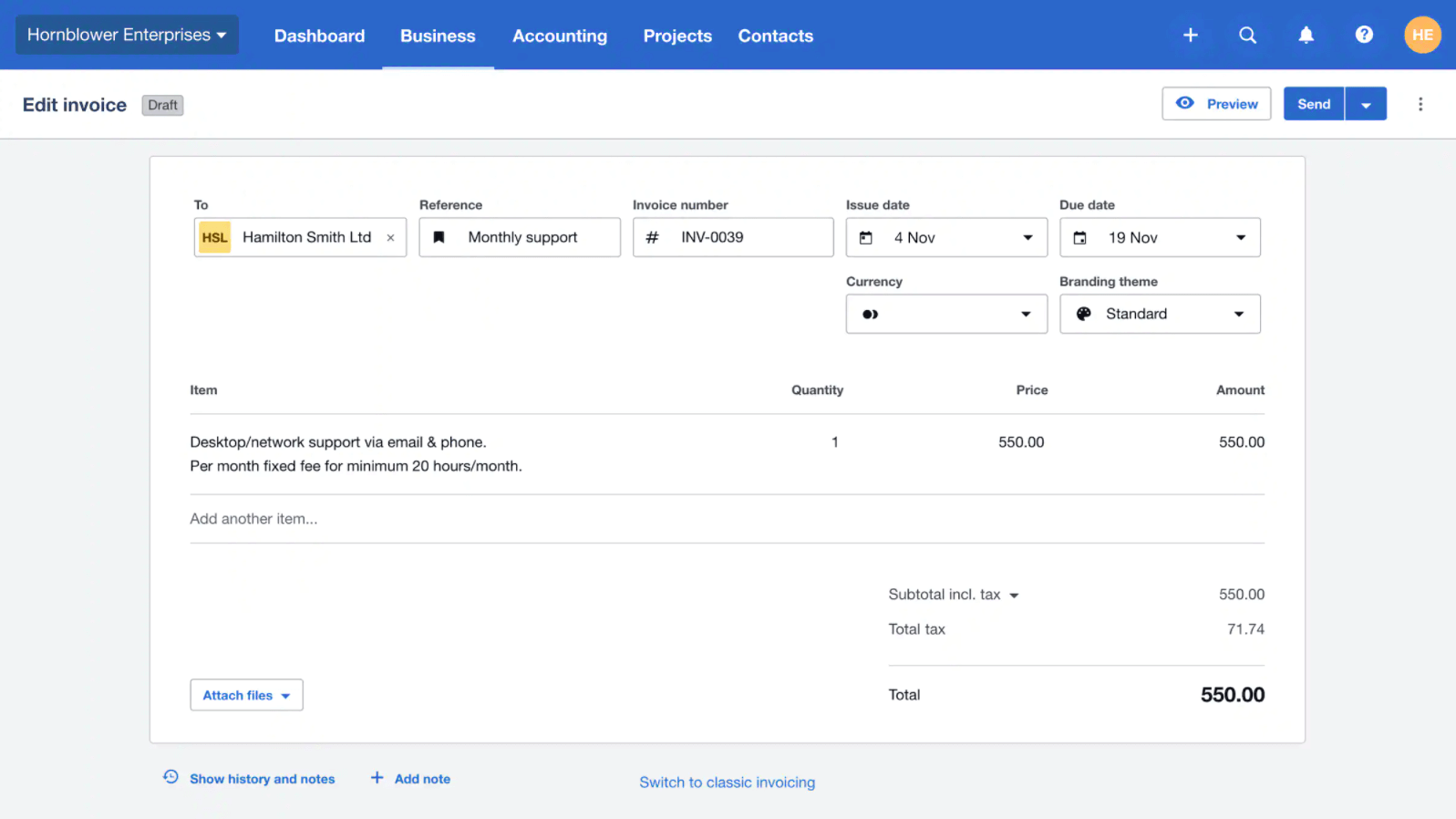
Source: Xero
Zoho Books vs Xero: Exploring the Dashboard
Both Xero and Zoho Books offer easy-to-use dashboards that provide businesses with a quick snapshot of their financial health. With these dashboards, you can track your key financial metrics and access important features like invoicing, expense tracking, and bank feeds directly from a centralized location. This can help you stay on top of your finances and make informed decisions about your business. Additionally, both platforms allow you to customize your dashboard to suit your unique needs and preferences, so you can focus on the metrics that matter most to you.
| Feature | Xero | Zoho Books |
| Cash flow | ✓ | ✓ |
| Outstanding invoices | ✓ | ✓ |
| Overdue bills | ✓ | ✓ |
| Statement balance | ✓ | - |
| Projects | - | ✓ |
| Total payables | - | ✓ |
| Total receivables | - | ✓ |
| Income & Expenses | ✓ | ✓ |
| Items to reconcile | ✓ | - |
| Expense claims | ✓ | - |
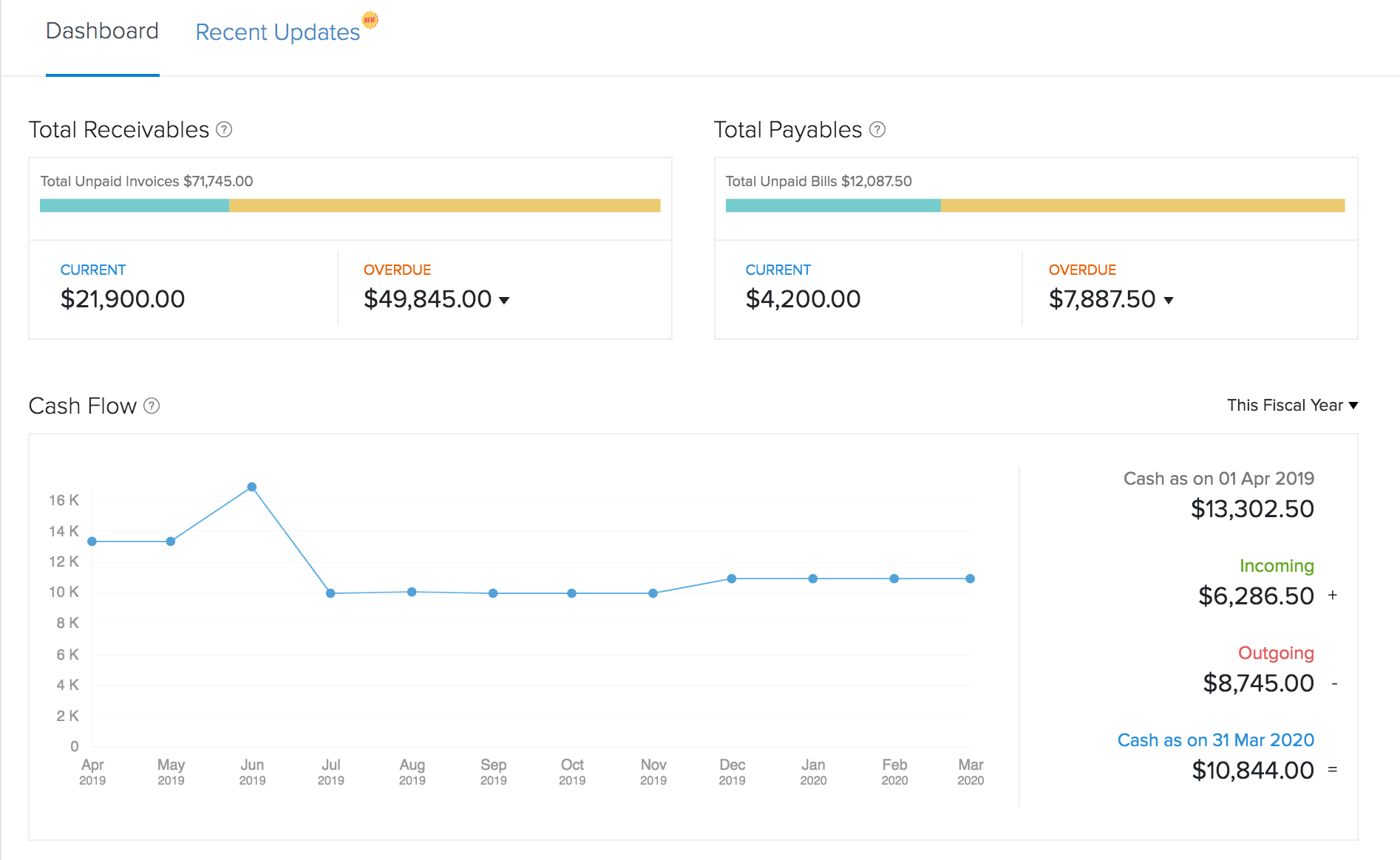
Source: Zoho Books
Xero vs Zoho Books: Comparing Bank Reconciliations
Bank reconciliation is a crucial aspect of accounting software, and when comparing Zoho Books vs Xero, Xero is more robust in this area. Xero offers advanced features that make it easy to match and categorize transactions, helping to streamline the bank reconciliation process.
On the other hand, Zoho Books offers a simpler solution that is still effective at reconciling bank statements but may not be as feature-rich as Xero's solution. Ultimately, the right choice for your business will depend on your specific needs and preferences. If you require advanced bank reconciliation capabilities, Xero may be the better choice, while Zoho Books could be a good option for businesses that prioritize simplicity and ease of use.
| Feature | Xero | Zoho Books |
| Suggested matches | ✓ | ✓ |
| Bulk reconciliation | ✓ | ✓ |
| Bank feeds | ✓ | ✓ |
| Add transaction as you reconcile | ✓ | ✓ |
| Automated transaction categorization | ✓ | ✓ |
| Bank rules | ✓ | ✓ |
| Alerts for mismatches | ✓ | - |
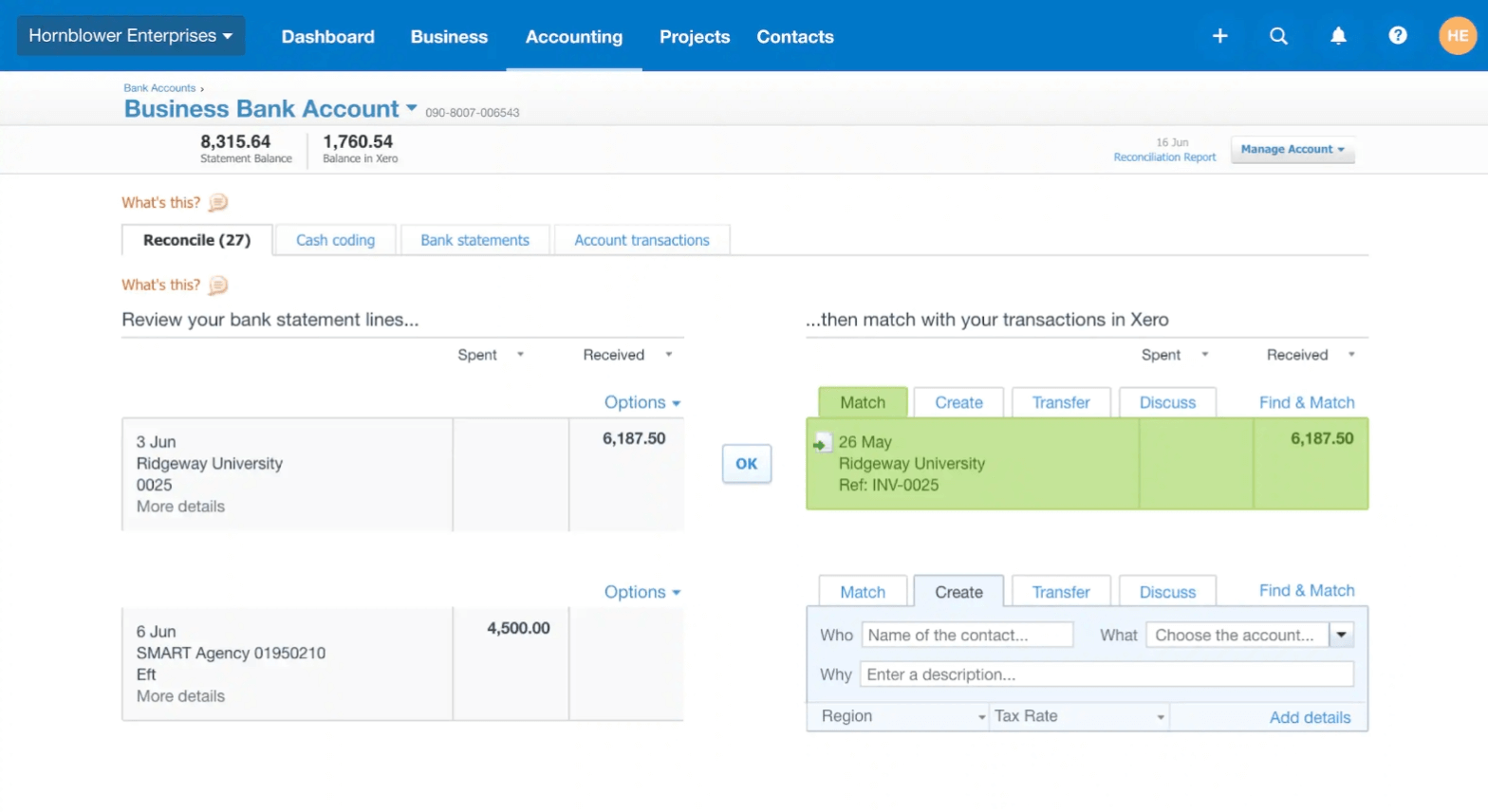
Source: Xero
Should You Use Xero or Zoho Books for Expense Tracking?
Both Xero and Zoho Books offer powerful expense management tools, including the ability to categorize expenses and scan receipts. However, there are some key differences between the two platforms that may impact your decision.
For instance, Xero's expense management features are particularly robust, with the ability to track expenses by project or client, automate expense reports, and even approve expenses on the go with the Xero mobile app. Meanwhile, Zoho Books offers a simpler but still effective solution that can help you stay on top of your expenses without getting bogged down in complex features.
Ultimately, the right choice will depend on your specific business needs and preferences.
| Feature | Xero | Zoho Books |
| Expense categories | ✓ | ✓ |
| Recurring expenses | - | ✓ |
| Mark expenses as billable | ✓ | ✓ |
| Record reimbursements | ✓ | ✓ |
| Scan receipts & auto-fill expense fields | ✓ | ✓ |
| Rules for automatic expense categorization | ✓ | - |
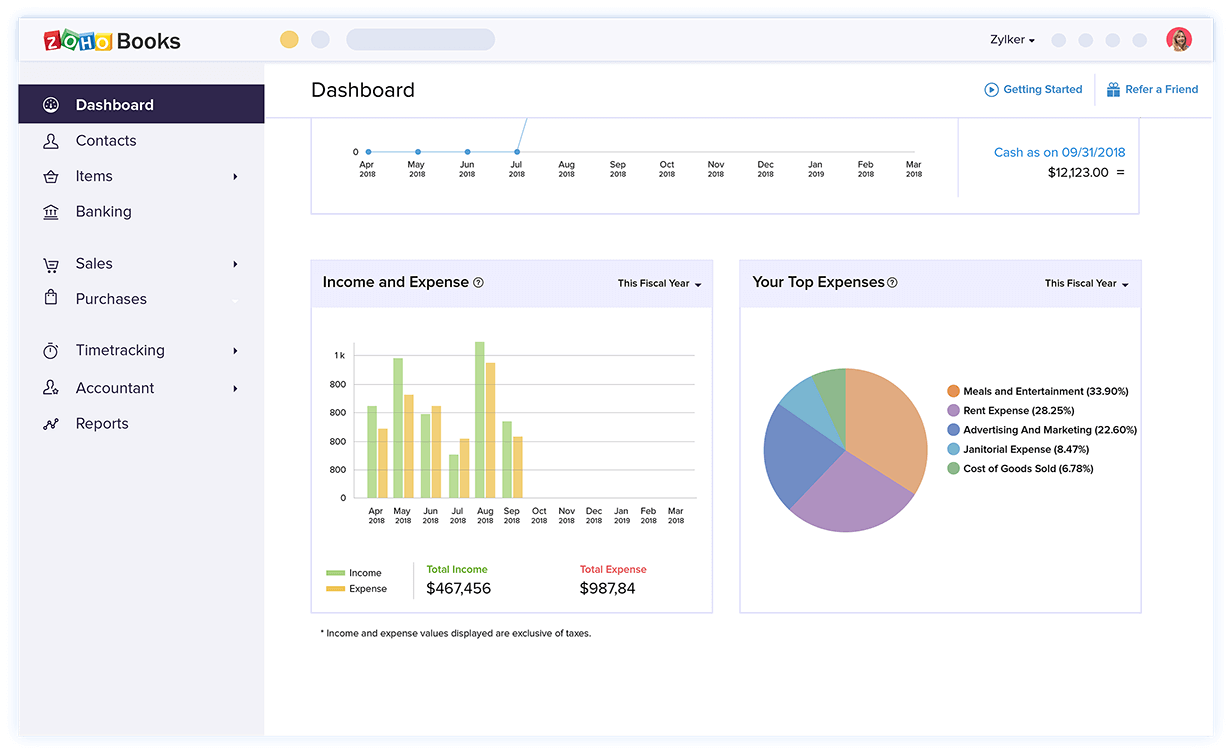
Source: Zoho Books
How to Manage Inventory with Xero and Zoho Books?
Both Zoho Books and Xero offer powerful inventory management features, including the ability to track stock levels, generate inventory reports, and make adjustments as needed. However, there are some key differences between the two platforms that may impact your decision.
For example, Xero's inventory management features are particularly robust, with the ability to track inventory across multiple locations, set reorder points, and even automatically calculate the cost of goods sold.
Meanwhile, Zoho Books offers a simpler but effective solution that can help you stay on top of your inventory without getting bogged down in complex features. Ultimately, the right choice will depend on your specific business needs and preferences.
| Feature | Xero | Zoho Books |
| Stock tracking | ✓ | ✓ |
| Best-selling & worst-selling products | ✓ | - |
| Inventory reports | ✓ | ✓ |
| Inventory price list | - | ✓ |
| Add stock items to invoice, quote, purchase order | ✓ | - |
| Inventory adjustments | ✓ | ✓ |
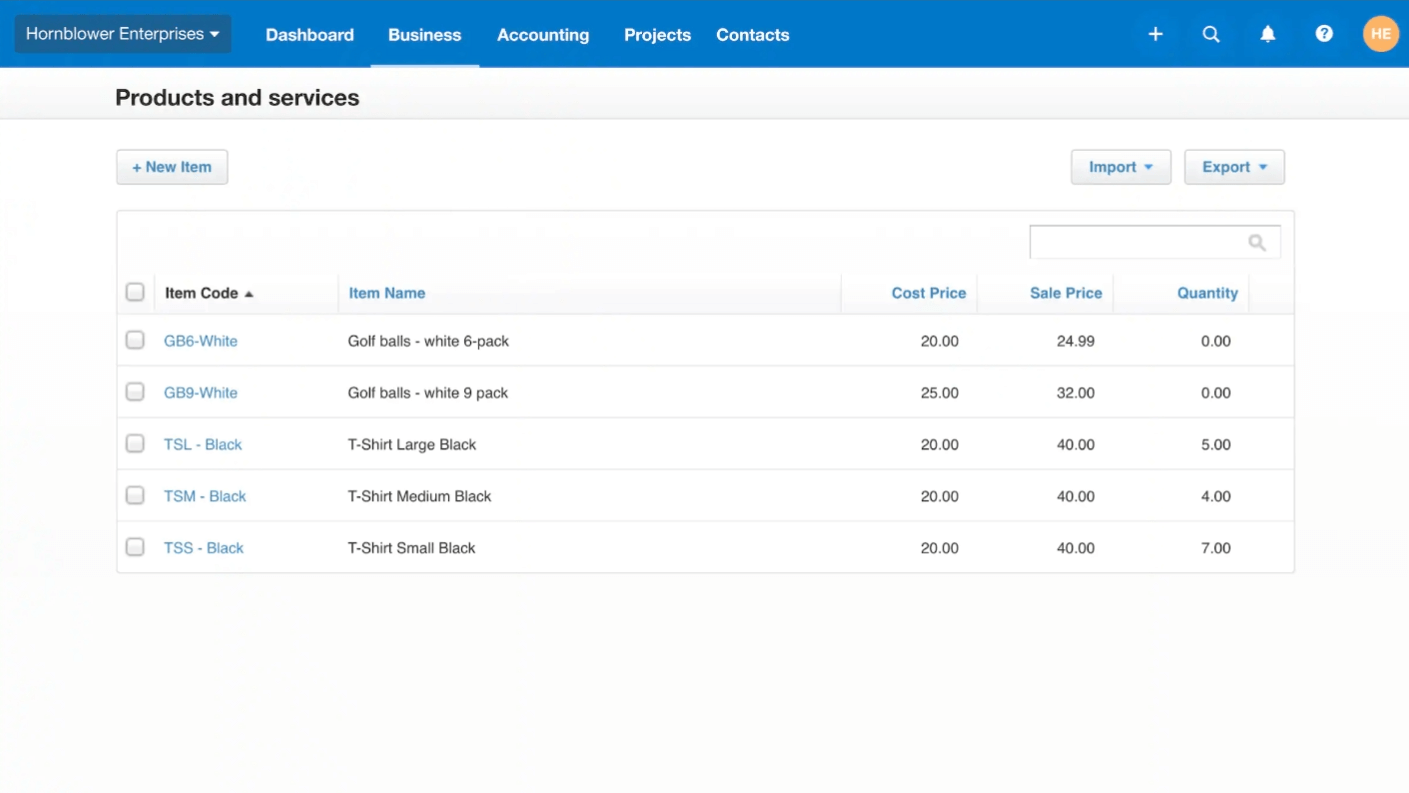
Source: Xero
Xero vs Zoho Books: Which Brings More Insightful Reports?
Xero and Zoho Books provide robust financial reporting tools to help you gain insights into your financial performance. Xero offers over 50 customizable reports and templates, giving you the flexibility to track the specific metrics that matter most to your business.
Meanwhile, Zoho Books offers a more streamlined selection of reports, but still covers key financial metrics such as profit and loss, balance sheet, and cash flow statements. Ultimately, the right choice will depend on your specific reporting needs and the level of customization you require.
| Feature | Xero | Zoho Books |
| Customizable accounting reports | ✓ | ✓ |
| Profit & Loss, Balance Sheet, Cash Flow Statement | ✓ | ✓ |
| Share reports with other users | ✓ | ✓ |
| Apply formulas | ✓ | ✓ |
| Export reports | ✓ | ✓ |

Source: Zoho Books
Can You Manage Bills with Xero vs Zoho Books?
Effective management of bills and accounts payable is essential for maintaining healthy cash flow and ensuring timely payments. Xero and Zoho Books offer robust tools to help you stay on top of your bills and manage your accounts payable.
With Xero, you can easily create, send, and track bills, set up recurring payments, and even automate bill payments through direct bank feeds. Zoho Books offers similar features, including the ability to create and track bills, set up payment reminders, and make online payments.
| Feature | Xero | Zoho Books |
| Track overdue bills | ✓ | ✓ |
| Set recurring bills | ✓ | ✓ |
| Approve bills | ✓ | ✓ |
| Schedule payments | ✓ | ✓ |
| Make batch payments | ✓ | - |
| Create vills from purchase orders | ✓ | ✓ |
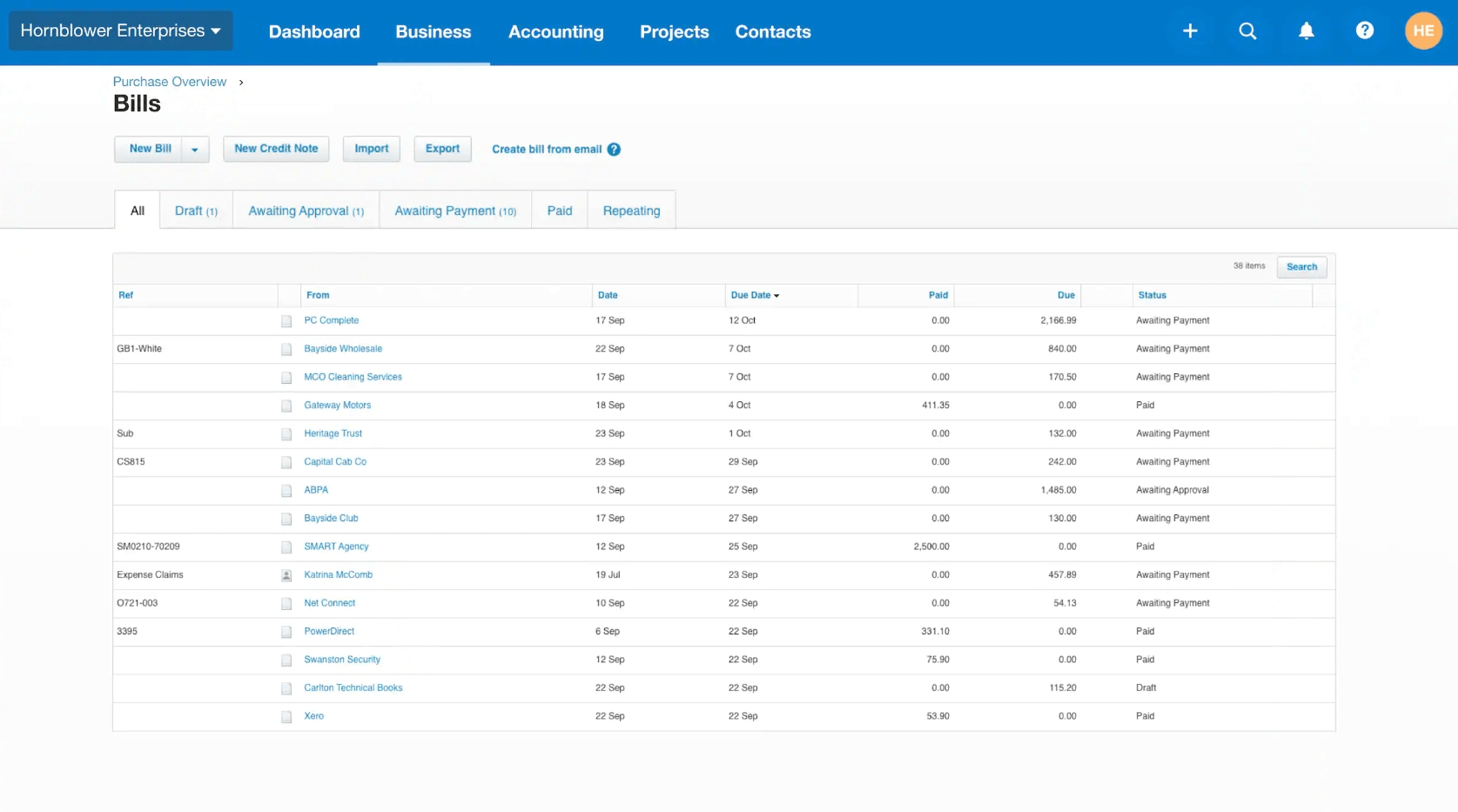
Source: Xero
Xero vs Zoho Books: Project Management Compared
Xero and Zoho Books offer project management features, allowing businesses to track time, costs, and profitability on specific projects. However, while Xero's project management functionality is more basic compared to Zoho Books, it does provide additional features such as mileage tracking and automatic project billing.
On the other hand, Zoho Books offers a more comprehensive project management solution, including task management, collaboration tools, and project budgeting.
| Feature | Xero | Zoho Books |
| Track time | ✓ | ✓ |
| Track mileage | ✓ | - |
| Track several projects at once | ✓ | ✓ |
| Assign tasks | - | ✓ |
| Add billable hours to invoices | ✓ | - |
| Approve/decline mileage claims | ✓ | - |
| Compare estimated vs actual project cost | ✓ | - |

Source: Zoho Books
Zoho Books vs Xero: Mobile App
Xero and Zoho Books offer mobile apps for iOS and Android devices, allowing businesses to manage their accounting and financial tasks while on the go. Zoho Books provides users with payment reminders and expense categorization features, making it easier to keep track of financial activities. However, Xero offers more advanced automation options, such as automatic invoice reminders, bank feed rules, and the ability to set up repeating invoices.
| Feature | Xero | Zoho Books |
| Create and send invoices | ✓ | ✓ |
| Convert quotes to invoices | ✓ | - |
| Add new customers on the go | ✓ | - |
| Categorize bills & expenses | - | ✓ |
| Check outstanding invoices | ✓ | ✓ |
| Send payment reminders | - | ✓ |
| Reconcile transactions | ✓ | - |
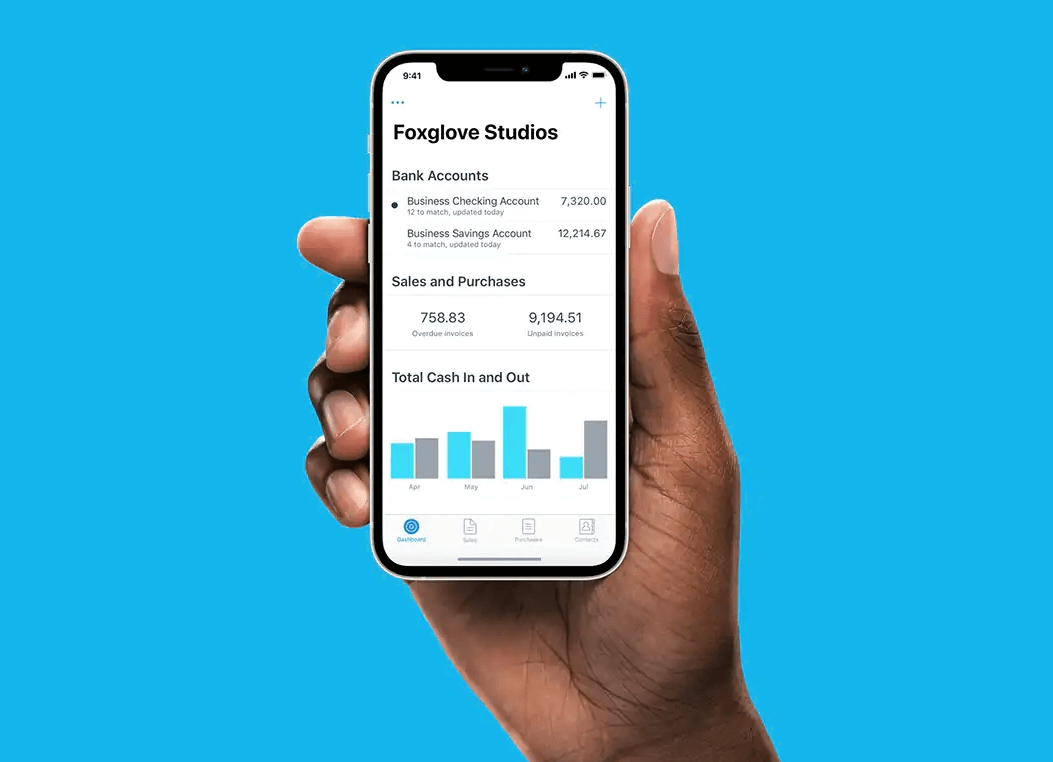
Source: Xero
Xero vs Zoho Books: Customer Support Compared
When it comes to customer support, Zoho Books is a clear winner, with phone support and live chat options that Xero lacks. This can be an important consideration for businesses who rely on timely and responsive support when using accounting software.
| Feature | Xero | Zoho Books |
| ✓ | ✓ | |
| Live Chat | - | ✓ |
| Phone | - | ✓ |
| Chatbot | ✓ | ✓ |
| Self-help resources | ✓ | ✓ |
Xero vs Zoho Books Integrations
Xero offers a broader range of integration options than Zoho Books, which can be beneficial for businesses with more complex workflows or a larger number of integrations. However, Zoho Books integrates with other Zoho products so that you can bridge your company departments.
Are Zoho Books Integrations Enough for Efficient Accounting?
Zoho Books provides integration with other Zoho products like Zoho CRM and Zoho Inventory, and this way, it enhances the all-embracing management of business accounting. Besides, you can integrate this tool with payment gateways like PayPal, Stripe, and Authorize.Net. However, compared to alternatives, Zoho Books offers fewer third-party integrations.
What Integrations Does Xero Have?
Xero offers an extensive marketplace with over 700 third-party tools for customer service, chat, payment, and more. It integrates with such popular software as HubSpot, PayPal, Stripe, Mailchimp, Shopify, Gusto, and others. This Xero feature allows you to easily sync your business data with other tools and get more management capabilities.
Which Is Better: Xero vs Zoho Books?
Xero and Zoho Books are popular cloud-based accounting software offering many features for comprehensive financial management. However, which is better for your business depends on your specific needs and preferences. Here are some key points to consider.
How Good or Bad Is Xero for Accounting?
| Pros | Cons |
| User-friendly interface: Xero has a clean, intuitive, and user-friendly interface that makes it easy for users to navigate the software. | No payroll in some countries: Xero does not offer payroll functionality in some countries, which may be a disadvantage for businesses dealing with clients worldwide. |
| Unlimited users: you can add an unlimited number of users regardless of the Xero pricing plan. | Limited customization options: Xero's customization options are limited, and users may need to use third-party apps to tailor the software to their specific needs. |
| Third-party integrations: Xero integrates with various third-party apps, such as payment gateways, project management tools, and CRM software. | Unsuitable for large businesses: Xero is designed primarily for small to medium-sized businesses and may not fit larger businesses with more complex accounting needs. |
| Excellent customer support: Xero provides excellent customer support through multiple channels, including email, phone, and chat. |
Zoho Books: Advantages and Drawbacks Analyzed
| Pros | Cons |
| Customizable: Zoho Books offers more customization options than Xero, allowing businesses to tailor the software to their specific needs. | No built-in payroll: to manage payroll, you need a paid integration with Zoho Payroll. |
| Recurring expenses: In Zoho Books, you can easily set up recurring expenses to save time. | Limited users: Zoho Books allows you to add up to 3 users on the Standard plan, while the highest plan has a 15-user limit. |
| Integration with other Zoho apps: syncing with other Zoho solutions enables you to get overall control over your business. | Limited integrations: Compared to competitors, Zoho Books has fewer integrations with third-party tools. |
| Affordable pricing: Zoho Books offers affordable plans, including a free plan. |
Xero Users: Who are They and Why Do They Choose it?
Xero is a cloud-based accounting software designed for small to medium-sized businesses. It benefits businesses that need real-time financial data and collaboration with their accountants or bookkeepers. Here are some types of businesses that can benefit from using Xero for their accounting management:
- Service-based businesses such as consulting firms, marketing agencies, and law firms.
- eCommerce businesses that sell products online.
- Retail businesses with multiple locations.
- Non-profit organizations that need to track donations and expenses.
- Freelancers or sole proprietors who need to manage their finances.
Xero has over 3,5 million subscribers across 180 countries and is most popular among companies with 10-50 employees.
Which Businesses Benefit from Zoho Books?
Zoho Books is a cloud-based accounting software that is suitable for small businesses of all types. It is convenient for businesses that need an affordable and easy-to-use accounting solution. Zoho Books features work for the following industries:
- IT services
- Marketing & Advertising
- Computer software
- Internet
- Construction
- Retail
- Design
- Telecommunications
Zoho Books is an excellent option for freelancers and individuals with zero accounting knowledge who want to manage their day-to-day bookkeeping. Most Zoho Books users are businesses with up to 10 members and 1M yearly revenue.
Tips & Tricks for Smooth Migration to Xero or Zoho Books
Automated data migration means your accounting data is quickly and securely transferred from one tool to another. How to try it out? Create an account on the Migration wizard, set up the migration and run a Free Demo as many times as you need to. After that, you can download the migration reports and check the IDs. Then, you proceed to payment and run the Full Data Migration. Remember to check the migration services and support plans before starting the automated data migration.
Xero vs Zoho Books: Which Accounting Software is Right for Your Business?
Xero and Zoho Books are excellent accounting software for small businesses. While Xero may be a better choice for larger businesses with complex accounting needs, Zoho Books makes a better option for small businesses with basic accounting needs and limited budgets. The best way to choose the right software is to compare your needs and budget with Xero vs Zoho Books offerings and take advantage of the free trials.
Frequently Asked Questions
Both offer cloud-based accounting software with many features, but Xero has a more extensive feature set, while Zoho is generally more affordable and offers more support options. The better option depends on your specific requirements.
Some disadvantages of Zoho Books include limited integrations with other software and user restrictions. Additionally, some users find the interface overly simplistic or not customizable enough.
The best accounting software for a business depends on its specific needs and preferences. However, some alternatives to Zoho Books include Xero, QuickBooks, and FreshBooks, which offer more extensive feature sets, integrations, and customizable options.
Xero is more expensive than some other accounting tools for small businesses. Plus, some users complain that Xero has a poor layout and lacks intuitiveness.
Want to migrate to Xero or Zoho Books?
Let’s migrate your data automatedly



